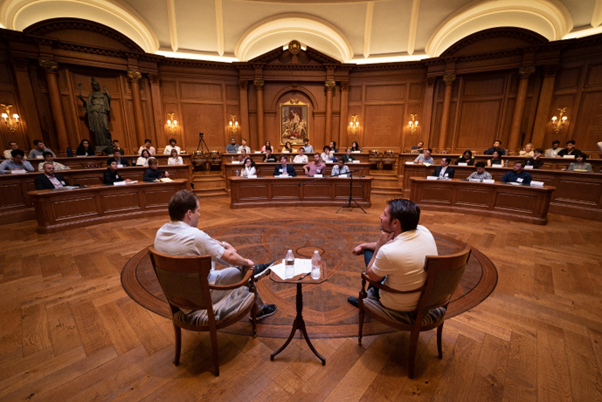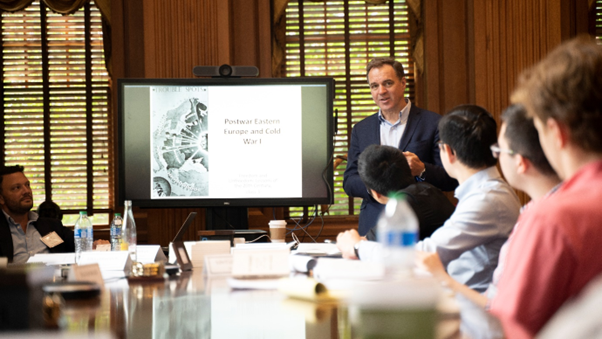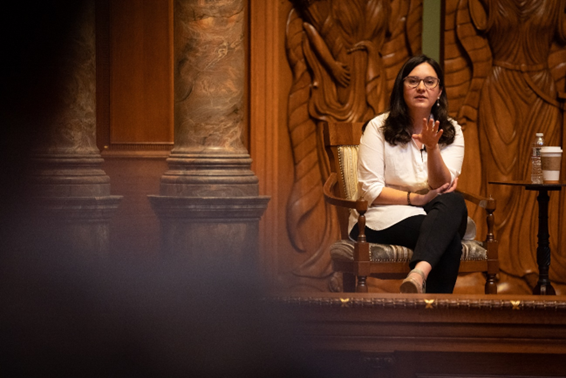Reading time: 9 minutes
Under the flag of morality, progressive thinkers shut their eyes to questioning their dogmas and claim the exclusive right to formulate the truth which ultimately corrupts civic life in universities. Woke people have sacrificed classical liberal ideals for the sake of an envisioned reality. They turn their back on civic values, and instead, pledge allegiance to progressive ideals that they want to bring to fruition with intellectual hegemony and autocratic means. In the wake of this phenomenon, Western universities have lost their true purpose and created an intellectual environment that at best can be described as fertile grounds for uniformity of thought. There is even a logical fallacy between the advocated liberal diversity and the tangible uniformity of thought on campuses. The western world has seemingly advanced to a stage of postmodernism where politics has sneaked into universities and has corrupted student life.
A recent study finds that “Countries with substantial declines in academic freedom include for example Brazil, Cameroon, India, Russia, Thailand, and the USA”, but the US also does a poor job when it comes to free speech. According to a survey by the Foundation for Individual Rights in Education, students from 159 universities have been asked in 2021 to evaluate their campus experience. More than 80% of students report censoring their viewpoints at their colleges at least some of the time, with 21% saying they censor themselves often.
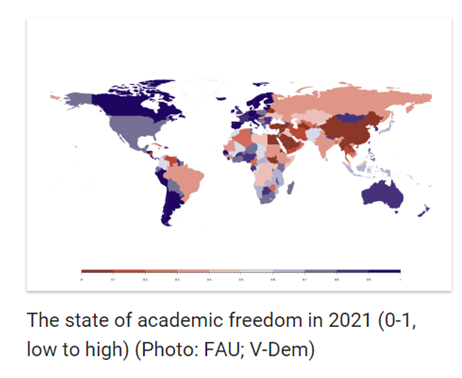
Cancel culture and ostracism of thoughts that do not flow along the mainstream are trending at American Universities, but what about Universities in Europe? Kinzelbach in a 2022 study finds that “Eastern Europe and Central Asia have fallen to a record low since the fall of the Iron Curtain (Kinzelbach, 2022). However, the principle of free speech is also fading in London. At King’s College London, some students tend to sacrifice their authenticity for the sake of conformity and a false feeling of social security. On the verge of intellectual uniformity in London, passionate, debate-driven discussions where disagreement is not mistaken with interpersonal insecurity, but quite on the contrary, could serve as a sign of trust and an opportunity for development is something I genuinely miss as a student of King’s.
Based on my experience at King’s College, academic freedom is not endangered by the university's attempt to top-down limit the curriculum, but rather by the intellectual exclusivity of many of my peers to be unwilling to question their own beliefs and tenets. As the former president of the Hungarian Society at King’s, I directly experienced the pollution of free speech when I labelled one of my letters as “ladies and gentlemen”. This has caused outrage among one of the society’s officers who protested by quitting. This was because I was unwilling to change how I address a formal letter without them engaging in a debate with me about the rationale of our deviating judgement on the matter. They were unwilling to discuss a matter that was directly relevant to their degrees and they resorted to ultimatum solutions by quitting. Simultaneously resulting in restraint of event organization within our student community. This also points to the underlying destructive feature of claiming intellectual hegemony. I am certain my case is not the only one.
The following graph is taken from a study of the FAU’s Institute of Political Science.
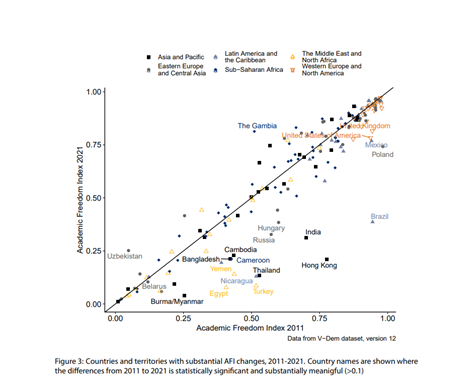
As can be seen, the United States has suffered great losses of Academic Freedom in 10 years between 2011 and 2021, whilst the United Kingdom is a little ahead. Hungary on the other hand has still much to learn.
Jacob Howland, the director of the Intellectual Foundations Program at UATX notes that “If we are to restore our society’s political health—and that is the awesome burden facing the rising generation of young Americans—we must recover the capacity of speech and reinvigorate the virtues that sustain it.” In Hungary, alternatively to central institutional arrangements, still, a lot can be done for the benefit of civic discourse and for the promotion of general education that encapsulates the virtues which Prof. Howland envisages. Initiatives such as Brain Bar may foster a higher standard for education. Brain Bar is an annual festival held in Budapest that hosts debates and discussions on the topics of the future by bringing together intellectual pioneers and non-conformist thought leaders from different places of the world to enhance the education of the public in Hungary. At the core of its foundation lies the same purpose as that of a newly founded university, The University of Austin, or UATX for short, that aims to re-establish the true purpose of higher education; to educate. Pano Kanelos, a Founding Trustee and the President of UATX writes that “liberal education is grounded in a particular kind of notion of human freedom and agency. The idea that if human beings free themselves from certain constraints in the pursuit of truth, then they will have the opportunity to move closer to something called truth.”
The idea of establishing a new institution by cultivating open discussions and debates as the very core of bringing about change excited me. As I have ambivalent experiences with my studies at King’s College London, I was even more honoured to have had the chance to take part in the first-ever academic program of the University of Austin called The Forbidden Courses. The name of the course itself is directed to point to the ever-growing need for an environment where learning can freely flourish without any arbitrary constraint. The university encapsulated just that since it was not polluted by the career industry of academia, nor by the cancellation of thoughts in the name of political correctness. Every student who I got the chance to talk to was curious and motivated to pursue their interest to the extremes and most importantly, willing to take an intellectual risk by letting their minds free. It was a week of intellectual and personal development. Being part of such genesis of people who dismiss conformity is my most valuable academic experience so far.
A seminar series that I attended at the Forbidden Courses of UATX, led by Professor Ferguson, shed light on unfree societies of the 20th century. I had the pleasure of taking part in this course and studied alongside courageous and bold thinkers of my age. Each session dealt with an example of a 20th-century authoritarian system. After having prepared a few hundred pages of reading for each session, Professor Ferguson initiated the seminar by asking questions that served as an entry point for discussion. Koestler’s Darkness at Noon and Solzhenitsyn’s work provided the basis for thinking about the Bolshevik Revolution. Das Dritte Reich was analyzed through the lens of Hanna Arendt’s, Klemperer’s, and Sinclaire Lewis’ work called It can’t happen here which helped us contrast Roosevelt’s regime and Hitler’s dictatorship by pointing to the thin line that the US also could have crossed. Further, it also shed light on the fact that democracy is not self-evident, and has to be nurtured. Moreover, the seminar series shed light on the differences and the analogies of the regimes and pointed to the fact that just as the Bolshevik Revolution and Mao’s China, for instance, exemplify ideology as a potential spark of a cultural revolution, the cultural shift of today is at the forefront of bringing about systemic changes and destruction to our society. Naturally, many believe it otherwise, just as many did around the roundtable of the seminars. The sessions of course did not conclude with any exclusive moral. Every student was tacitly required to draw their own conclusions about the common foundation of knowledge that the background readings and Prof. Ferguson’s questions were aiming to provide.
Prof. Ferguson’s seminar was not the only program the Forbidden Courses had to offer. Peter Boghossian, Philosopher and author of the book “How to Have Impossible Conversations” led a workshop on Street Epistemology, a public conversational tool that helps to reflect on the quality of perceived ideals and beliefs by deconstructing their underlying reasoning. Such a methodological effort is an effective way to engage in public debates and elevate the quality of civic discourse that I got to experience first-hand with my peers. One of the biggest advantages of engaging in civic discourse with the help of such a method is that it offers a satisfying result as it involves majority decisions along the process of conversation. Ideals and problems are dealt with by priority building in multiple steps.
I also got the chance to engage in discussions with Michael Solana, Vice President of the Founders Fund which was brought to life by tech entrepreneur and billionaire, Peter Thiel. Mike talked about the technological developments of social media and their implications on information and innovation. Social media regulation is by definition very negative in the eyes of many Americans for reasons to be found in their traditional ideals of the inviolability of a private structure, for instance, a privately held company. But what about the inviolability of free speech? Maybe the First Amendment has to be implemented in those virtual venues as well so that free speech can flourish. But this would de facto mean regulating social media. Mike’s workshop was a mind-stretching exercise for the inquiry into the tough questions.
The list goes on with the invaluable opportunity to have talked to Joe Lonsdale, tech entrepreneur, investor and the host of American Optimist. He led a workshop on how companies impact the world, and what entrepreneurship teaches us about what is functional or broken in our current institutions. Geoff Lewis on the other hand is the founder and managing partner of Bedrock and he talked about the unconventional routes an entrepreneur has to make by following instincts instead of established career pathways. Geoff also touched upon why teams usually fail, and he condemned power-seeking while welcoming the synthesis and co-existence of various types of people as the bedrock of a high-functioning team.
I decided to join UATX because I was in search of ways I could further my education outside the orthodox settings of higher education. I thought that being part of the founding student cohort of such an initiative is a great privilege. The popular tendency to not only disregard but to ban plurality of thinking would lead to a serious backlash against civilization. As such, it cannot be treated as a proxy problem.
UATX, is a venture to offer an alternative to academia, and an endeavour to shift higher education back to its true purpose. That is the freedom of thought and freedom of speech. By cultivating open discussions through the clash of ideas, at UATX, you can think freely without moral and social scrutiny and without getting cancelled for merely daring to think. UATX is the place where people do not treat their moral views as the ultimate truth, but quite on the contrary, they welcome disagreement as the bedrock of civic engagement and intellectual flourishing. By taking part in the Forbidden Courses, I certainly gained a long-lasting impact that will nurture my curiosity and further incentivise me to withstand the ever-luring shadows of conformity.
- written by Róbert Janzsó
